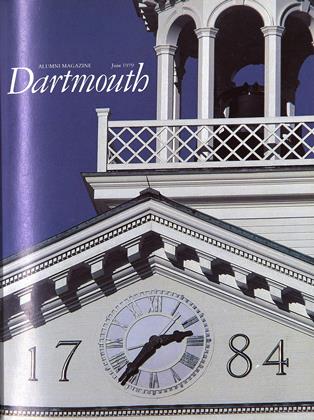Student government has risen like the Phoenix from ashes moldering these ten years. Where a decade ago, the old Undergraduate Council was abolished by student action - partly for ineffectiveness, partly for lack of interest - it has returned by student demand.
Some 2,000 undergraduates signed petitions calling for a collective voice on campus. A Student Government Study Group set to work and toiled long months to come up with a constitution and an election system that would have confounded the shrewdest old pol from Tammany Hall or the Politburo.
It goes — and in late April, it went — like this: each student could vote 32 points, corresponding to the 32 seats to be filled, to be distributed in any way he or she chose. It is a system deliberately designed to facilitate block voting, and all sorts of special-interest groups examined the 99 candidates' positions on various issues such as fraternities, minority interests, or Trustee investment policies, then recommended that members plunk down all 32 points for one like-minded candidate or split them among a few sympathetic to the cause. The study group had figured that it would take 30 to 50 solid 32-point "bullet votes" to elect a candidate.
The top eight point-getters in the freshman, the sophomore, and the junior classes were assured the first 24 seats. Then the next eight, regardless of class, were elected. The remainder of the 42-member council will be picked in the fall by the Class of 1983.
At the Undergraduate Council's first meeting last month, President Kemeny praised the organization as "an ideal training ground" for leadership and predicted that the Trustees "will be much happier to have student input" from an established organization than from a chorus of different voices. "A clear consensus of students can have influence with the Trustees," he said.
After the President's remarks, a senior member of the study group declared that one of the first goals of the council should be the appointment of a student Trustee. At their second meeting, the members elected officers and passed a resolution, with only one dissenting vote, calling for 8:00 a.m.-to-midnight library hours daily.
At their third meeting, they gave further evidence of intent to be movers and shakers by voting their support for "the efforts of the CSEA [Concerned Students for Equal Access] to aid in the implementation of the Board of Trustees' 1979 decision on admissions and [to] promote truly equal access in admissions." They further requested the dean of the College and the director of admissions to respond to the equal-access group's proposals within two weeks of their submission.
Wondering what the people who presided over the demise of student government in 1969 might think of its resurgence and the rather cheeky approach of their young successors, we rang up F. Samuel Faber III '69, chairman of Palaeopitus that tumultuous year. Now a physician in family practice in Harrisburg, Pennsylvania, he kindly squeezed us in between patients.
"I think it's fantastic," he said. "Disinterest is no way of life; apathy is no way to fly." Actually, he recalled, "lack of interest was only part of the issue. There was a feeling among part of the student body and part of the student government that there was no point in conducting a student government - there was really no power and no real function to perform."
Faber doesn't remember any special precipitating cause. "Several things happened around that time on the campus that had to do with our interaction with the dean's office. That was about half the picture; the other half was apathy." All the while, he reminded us, "we were having demonstrations at Parkhurst and the whole business over ROTC, and there was an atmosphere of distrust on the campus. I'm glad that's changed in part."
While taps were being played over the old undergraduate council, student leaders and the Trustees met to talk it over. "There was a feeling among us all that when the time was right, things would start all over again," Faber said. "I'm actually surprised that it took ten years."
 View Full Issue
View Full Issue
More From This Issue
-
 Feature
Feature'We will all make whoopee'
June 1979 By Dick Holbrook -
 Feature
FeatureE – i – e – i – o
June 1979 By Marshall Ledger -
 Feature
FeatureExit with a Flourish
June 1979 By Beverly Foster -
 Feature
FeatureEncouraging growth, affirming the educational process
June 1979 By Robert Kilmarx -
 Article
ArticleCommencement
June 1979 By James L. Farley -
 Article
Article'Radical' with a Cause
June 1979 By Tim Taylor








